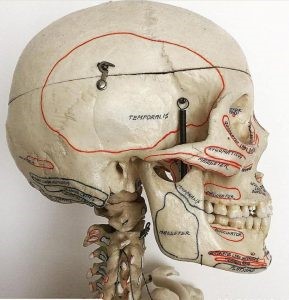
So You Have Jaw Pain! Why are Muscles Important? What Damage Happens With Unhappy Muscles?
![]() 😁 Many of you already know this, but for those who have the question of what a Las Vegas Institute (LVI) trained dentist will look for, analyze, and how it all connects this blog’s purpose is to put it in simplified terms. Dr Jim McCreight has taken advanced training at LVI helping him with complex TMJ/TMD issues that some dental clients have. This approach to treating jaw pain is called a “physiologic approach”.
😁 Many of you already know this, but for those who have the question of what a Las Vegas Institute (LVI) trained dentist will look for, analyze, and how it all connects this blog’s purpose is to put it in simplified terms. Dr Jim McCreight has taken advanced training at LVI helping him with complex TMJ/TMD issues that some dental clients have. This approach to treating jaw pain is called a “physiologic approach”.
Question: What directs the relative positions of our bones?
Answer: Muscles ![]() 💪
💪
Take a look at all the regions that outline muscle attachments: muscles are linear but as a group they will move the body in 3 dimensions. All these bones are connected to each other through muscles.
The body will do everything to (1) breathe and (2) eat also known as basic survival basics.
Muscles will strain constantly (ouch!) if needed to ![]() ✔️open the airway and
✔️open the airway and ![]() ✔️get teeth together to chew. When muscles are strained pain occurs.
✔️get teeth together to chew. When muscles are strained pain occurs.
If the body doesn’t have a sufficiently developed anatomy from a young age ![]() 🌱, the strain that is necessary to compensate (in order to breathe and eat) can lead to PROBLEMS
🌱, the strain that is necessary to compensate (in order to breathe and eat) can lead to PROBLEMS ![]() 😕 These problems can result in jaw pain.
😕 These problems can result in jaw pain.
We see these problems reflected in ![]() 🔥teeth damage and misalignment
🔥teeth damage and misalignment ![]() 🔥TMJ damage or pain
🔥TMJ damage or pain ![]() 🔥noises in function (such as clicking jaw joints)
🔥noises in function (such as clicking jaw joints) ![]() 🔥poor posture (like forward head posture or head tilt, full body slouch)
🔥poor posture (like forward head posture or head tilt, full body slouch) ![]() 🔥 and PAIN (neck pain, Jaw pain, migraines), etc.
🔥 and PAIN (neck pain, Jaw pain, migraines), etc.
Therefore, the goal is to address the![]() 🌟
🌟![]() 🌟
🌟![]() 🌟 AIRWAY and BITE
🌟 AIRWAY and BITE ![]() 🌟
🌟![]() 🌟
🌟![]() 🌟while encouraging the muscles to support the rehabilitated position in correct posture, so muscles don’t have to strain or hurt anymore
🌟while encouraging the muscles to support the rehabilitated position in correct posture, so muscles don’t have to strain or hurt anymore ![]() ✔️
✔️![]() ✔️
✔️![]() ✔️
✔️
This is what LVI physiologic dentists do.
Guest Blogger: Dr Dagmara Ventresca
Edits: Dr James W.W. McCreight
